We woke up at 6 am and headed into the bathroom. We turned on the tap in the sink to hear a disappointing "gurgle gurgle gurgle" with absolutely no flow. We turned off the tap and turned it on again in disbelief. No water this morning? We checked the shower. No luck here, either. We paced around the room for a few minutes and then tried again. We were relieved that now we at least had cold water. Good enough!!
We took super quick cold showers and then headed outside to breakfast.
Craig went to grab a table while I took a walk around the grounds to get some pictures in the daylight. The hotel incongruously had a mini golf course on premises. There were a variety of modern-looking holes (loop-the-loops, narrow bridges, banked corners, even a mosque!) but it looked fairly impossible as the "greens" were actually concrete. There was no way to contain the balls, which would probably roll right off the course and into the nearby stone-bottomed swimming pool near the closed-up poolside bar.
I followed the meandering stone pathways to the restaurant. Craig pointed me at the sparse buffet table, which consisted of hot water, Nescafe packets, bread, and a Tang-like orange drink made from powder. The others joined us soon, and we were able to get some Laughing Cow cheese packets, but only when we specifically asked for them. Waitstaff in Mali never really offered anything up; it must be a cultural thing. We Americans feel like we are pulling teeth trying to get anything, but the waitstaff tend to feel that if we want something, we'll ask. Shortly after 8 o'clock, we were done with breakfast and ready to go to Kori-Maounde. Tina and Susan were both feeling much better today, so our group was intact once more.
Bouba greeted us at the car by saying "Yes, I am hungry. Yes, I have a mango." We were delighted that he remembered this from the English class last night. "Bouba want to go?" someone asked. "Bouba want to go New York," he replied with a grin. He drove us down the street and around the corner to Timothee's house (where Anna was living, and where the tree seedlings were stored). Tina went into the courtyard and met Timothee's wife Estelle, who said that Anna was at the market. Estelle led us to the seedlings, and we carried them out to the car. We watched the neighborhood people going through their early morning routines. A couple of pigs wandered nonchalantly down the street.
Anna returned on her motorscooter, and soon Timothee returned as well. Bouba and Bahini started off by trying to put the seedlings on the roof, but soon it was obvious that even if we covered them with a tarp, they would never survive the half-hour journey to Kori-Maounde. There was not enough room inside the car for all of us and the plants. We lined the interior of the car with bags and boxes to protect it from soil and dirt, and loaded the car up with plants. Anna sat in front with Bouba, and we asked if we could squeeze in. Bouba would come back for the others, of course, but we wanted to be there as the plants were delivered, to get to see the children and start working as soon as possible. Bouba agreed, and Craig and I crammed into the back, kneeling down amongst the trees.
When we got to the village, the kids greeted us and we unloaded the trees. Bouba went back to Timothee's house to pick up Tina, Pam, and Susan. The water basin was looking fantastic, and the men were working filling dirt into the trench, burying the pipes that had been laid.
We followed the kids to the water hole down behind the garden to get water for the plants. They started to spontaneously sing as they dipped their plastic buckets or USAID tin cans in the water. It was beautiful. I tried to capture it on video with my camera, but as often happens, the kids were distracted by the presence of the camera and stopped singing. We tried to encourage them to sing again, but not knowing the language was difficult. "La la la!" I said, trying to prompt them to resume their song. "La la la!" they repeated. It soon became apparent that they weren't going to start singing their song again, but they were game to repeat everything that we said.
Craig soon adapted this into a game of call-and-response field hollering. "OK, Let's go!" "OK, let's go!" they would respond in unison. "Let's get the water!" "Water for the garden!" Craig led them back to the garden where they were quick to dump their buckets on the plants and show that they were ready to go. When all of the buckets were empty, he would lead them back to the water hole, doing their sing-song call-and-response the whole way. He looked like the pied piper, with 153 kids swarming around him. When they got to the water hole, they would want to be the first one to refill their bucket and be ready to head back to the garden.
He kept them going at an efficient pace. The young female teacher Djeneba Perou had a huge smile on her face as she watched them. Daniel and the chief were both amused and impressed at Craig's ability to motivate the students. I stayed in the garden to try to get some photos of them in the distance (close-ups are difficult because the children will just jump right in front of the lens to try to get into the photo). After three trips had been made to the water hole, Craig got the children to ask Daniel in unison, "What do we do next?"
Anna suggested that it might be the proper time to present Daniel with the frisbee we had brought for the school. Craig led the children in the following chant "Let's play frisbee! Let's have fun! Ok, let's go!" The students held hands and formed a large circle out behind the school. Craig and Anna stood in the center and demonstrated how to throw and catch the frisbee. Then Craig threw the frisbee to the circle and the children scurried to catch it. The child who caught it would then throw it. Anna and I helped the kids to hold it and demonstrated the throwing motion to them. All of the children were excited and everyone wanted a turn to catch and throw. After some got the hang of it, they would help others.
At 10:30, Bouba's car arrived and Tina, Pam, Susan, and Bahini joined us. We wrapped up the frisbee game as everyone was excited to finally plant the trees. Daniel and Pam ceremonially planted the first tree, first peeling the plastic off of the roots, and then planting it into the hole and gently covering up the roots. Daniel then directed which variety of tree would be planted where, and kids divided up into spontaneous groups at each hole to plant the trees. The kids took the task very seriously.
Craig led an army of kids back to the water hole, and they returned with buckets of water for the newly planted trees. As the planting was slowing down, Tina and Pamela were playing with the kids, teaching them English phrases "How are you? Fine, thank you!" and also numbers. The kids would come up to us to practice their newly-learned phrase in sing-song voices. "How are you? Fine, thank you!" like a little poem. A little boy and his younger toddler brother were watching me take photos. The older boy indicated that he would like a photo taken. He sat with his brother on his lap and I snapped a photo. When I went over to show it to him, the younger boy started to wail. The older brother just smiled, picked him up, and walked back toward the village, trying to calm him down.
When it was time to break for lunch, Daniel and chief Amadou Napo invited us to take a village tour. We were excited to get to see the village. All week we had seen it perched on the cliff above us as we worked in the garden. We had seen Daniel's house, but didn't have a real conception of the village as a whole. We walked through a crack in the earth directly behind the garden. It was like we were venturing back in time. We had seen women and children walking in this direction, bringing water to the village from the water hole. A precarious-looking log bridge spanned the gorge about 20 feet above us to provide quick access for locals, but it wasn't anything that any of us would dare to cross.
We wandered the labyrinth of mud and stone buildings separated by earthen paths. Everything felt so organic - structures were made of only mud, stone, and sticks on a plateau of sandstone. Here and there trees had managed to grow in cracks. Windows were holes in the walls which may be covered by a wooden shade. There is no glass anywhere. Goats and donkeys roamed the narrow alleyways between buildings.
Villagers stopped what they were doing to gawk at us, many of them having only seen us from a distance over the past few days. Everyone had a friendly "Ca va" for us when we greeted them. We passed granaries and togunas. Chief Amadou Napo led us to the house of the village chiefs. I noticed a village man and boy peering over a rock wall at us. They smiled as I took their photo and then walked over to show them. We entered the house of the village chiefs, a mud brick structure with a plain wooden door which had a carved wooden lock mechanism. It was dark inside. Thick wooden beams held up a ceiling made from sticks and affixed together with mud. They pointed out a flat stone on the ground where people sit and put their hands over their faces. They believe that this makes people's problems go away. We all tried it, just in case.
Groups of curious children gathered to watch us. We saw a mother goat with her baby, which looked like it was maybe a day old at the most.
Notched wooden logs were used as staircases to get to upper floors of the buildings.
We saw the old mosque which was in disrepair. Right next door was the more modern new mosque, with its textured walls, bright blue door, and rebar instead of wood sticking out of the mud. We experienced a real sense of time warp - as we saw a donkey in a narrow alleyway between mud buildings it looked very much like scenery from biblical times.
We were brought to an overlook which had a perfect view of the school and garden. We had seen many people watching our progress from this spot in the last few days. It must have been an impressive sight when there were nearly 200 of us working on it together!
We could see just how much progress had been made on the garden, and we were all quite happy.
Since Daniel is not from Kori-Maounde (he was assigned this post by the school district) he needed to choose honorary parents among the villagers. Now we went to the home of his honorary father, a blind man who greeted all of us with a smile and a handshake. We could tell how much Daniel respected this man and how close they were.
It was a little past 1 o'clock by the time we arrived at Daniel's house for lunch. Marie served us fonio (a grain) and chicken with peanut sauce.
It was quite tasty. We had tamarind tea to drink, and we enjoyed our siesta time after walking through the village in the hot midday sun. We knew it was 1:30 when the soap opera ritual began inside the house.
Daniel thanked us and gave us a lot of information about Kori-Maounde. He explained that he is trying to impress on the parents that it is important for their children to be educated. Though there are 153 students, there are more children than that in this village of 800. Some parents see their children as more valuable as farm workers than students. Dogon villages tend to be either Muslim, Christian, or mixed Muslim and Christian. Kori-Maounde is a Muslim village, but Daniel is a Christian. It was nice to see him accepted into the community, and the fact that the chief and village elders obviously respected him.
He told us that the average age for marriage in a Dogon village today is 15 or 16 for girls and 22 or 23 for boys. Many of the marriages are arranged by parents when the couple are just babies. They are not allowed to refuse an arranged marriage, but men can choose additional wives later. The Dogon don't try to control their population despite scarcity of resources. They believe that God sends children and God will provide for them. The nearby health center has been instrumental in fighting previously widespread infant mortality - none of the villagers who have gone to the health center to give birth have lost their babies.
Daniel said he was impressed by Craig's ability to motivate the kids to get water, and that he himself would use that technique to get the kids to stay on task in the future. He was very glad that the men of the village were inspired by our visit to work so hard on the water basin and garden. He said that they have had good intentions, but sometimes have trouble coming up with motivation to actually do school projects. We could tell that there was some peer pressure going on, because when a man would occasionally sit out work on the garden for too long, the others would harrass him for his laziness. This is borne out by a quote that I found in Walter van Beek's Dogon: Africa's People of the Cliffs: "Labor creates public esteem and secures social position."
Before their converion to Islam, the Dogon were susceptible to slave raids where non-Muslims were captured and sold into slavery. They lived in the cliffs and didn't venture very far from the cliffs for agriculture. But when French colonial rule brought the slave trade to an end, the Dogon were able to venture to fields which were further from their protected cliffside homes. Onions were actually the first cash crop for the Dogon when they could no longer survive by subsistence alone and had a need for actual money. This explained the popularity of onion farming in this region, and we could attest that the onions grown here are delicious!
At 3 o'clock we headed back down to the garden. We passed Daniel's daughter on the way. She had a teddy bear tied in a sling on her back, the way Malian women carry their babies. Pam picked up a small puppy and carried it to the garden. When we got to the garden, Susan noticed a child with a bad scrape on his forehead. Susan and Anna tended to him, and got it all cleaned and bandaged. Anna, who coordinates medical volunteer vacations in Ecuador, was quite prepared, with rubber gloves, bandages, gauze, and a plastic syringe for cleaning the wound. Many children watched the process with curiosity, and the boy with the scrape seemed rather overwhelmed by what was happening to him, but after a few minutes he was cleaned and bandaged and back to his day.
All of a sudden, one of the students, totally unprompted, said "Ok, let's go!" (which they had learned from Craig earlier today!) We were very proud of them for having remembered the phrase and using it properly. Daniel had said that since the garden work was done, we could spend the afternoon cleaning up the school campus. He had apparently told each child to bring a broom from home when they returned from lunch. He lined up the children shoulder to shoulder across the school courtyard and then told them to go. They all bent forward and started to sweep the ground. Huge clouds of dust filled the air as an army of kids moved forward as one. Within minutes, the entire coutryard had been swept and there were various piles of debris on the perimeter.
Daniel then charged the students with picking up non-organic trash from these debris piles and putting it in the trash pile behind the school for eventual burning. We understand that this is how trash is generally dealt with in this area, but we hated to think of our students being subjected to a smoldering pile of plastic waste in such proximity to their school and village. I went to my backpack and pulled out a couple of plastic bags. Craig took one and I took the other and we asked the children to place the non-organic waste in the bag. We would take the bags back to the hotel and dispose of it there, in the trash.
The kids all took direction very well and soon I had a large bag full of trash. Daniel directed some students to pick up large stones and dung and move them from the courtyard area. Craig took his trash bag over to the garden, and picked up such discarded items as corroded batteries and plastic debris. He explained to the kids that it is not healthy to have such waste in the garden soil.
Craig then took the kids on a final water-gathering mission. Four kids stayed with me in the courtyard, and we picked up the few remaining pieces of debris that we could find.
When the courtyard and garden were spic and span, we played some more frisbee. This afternoon the kids were a bit more wound up. Some of them seemed to be bursting with energy and just jumped and danced while they stood in the circle to catch the frisbee, unable to stand still. With one group of little girls especially, fights started breaking out. We eventually had to abandon the game since the kids were getting a little out of control, and one girl was pushed to the ground and scraped her arm.
We just hung out in the schoolyard and the kids congregated near us. One group of kids came up to Craig and I and sang us a really pretty song. Their voices just seemed to blend together so naturally, and they had broken into song so spontaneously - it was beautiful. We enjoyed listening to them sing for several minutes.
Susan came over and started to sing "Head, Shoulders, Knees, and Toes" with the kids. She was a big hit! The kids sang along with her and did all of the gestures, and she would speed up the song and they would get lost and then dissolve into a fit of giggles. Daniel came over and he even got in on the act. The kids seemed to really enjoy seeing their teacher struggling to keep up with Susan's brisk singing pace. Everyone had a good laugh. Daniel said that he would learn the words and use it in his PE class.
We went back to the garden as the late afternoon light became golden and the shadows became long. Daniel, Chief Amadou Napo, and parent Boureima Napo gave speeches thanking us for coming to their village and working alongside them, and caring about the welfare of their school. The chief said a blessing for us. We were very moved by their sincere and heartfelt speeches. We had really enjoyed our time here and had felt extremely welcomed by the entire community.
We thought back to just three days ago, when we had first met the villagers - on how excited and eager we had all been to get started on the garden project. Now, 72 hours later, a new water basin had been built and plumbed, and all of the new trees had been planted. We had worked and played alongside the community, we had shared meals in Daniel and Marie's home, and we had been shown an important site in the history of the Dogon of Kori-Maounde. We felt like a part of the community, and it was difficult to say goodbye. We said our goodbyes and heartfelt thanks and shook hands with the adults in the garden.
As we worked our way back to the car, we shook hands with as many kids as we could, saying goodbye and thank you to everyone for the final time. They were all so sweet, hard-working, and eager to learn. They insisted on carrying our bags to the car for us. It was so hard to say goodbye. The whole thing had been such a great experience, and we had looked forward to coming back each morning. It seemed strange that tomorrow morning we would be leaving Bandiagara.
We were quiet and contemplative as we got into the car, just thinking about the events of the last three days and the culmination of our efforts. This community had truly welcomed us and we would miss their companionship. As Bouba drove us away, we smiled and waved back at the kids, forcing smiles though we were sad to leave. We wished the community the best of luck with the garden, and we hoped that it would be bountiful and provide money for school supplies for years to come. Perhaps we would be able to return someday to see its progress.
We arrived at the hotel, and it was time to change gears. We took very quick showers and changed our clothes. Bouba drove us (with Bahini in tow this time) to our final English class. The kids met us in the street as we got out of the car, and they greeted us politely and formally. They were relieved to see that Tina was back after her illness yesterday, and they greeted her warmly.
Tonight we focused on directions - left, right, straight, turn...etc. We thought this might be useful in speaking English with tourists in need of directions. We had them follow our English directions, and had them give English directions to Susan. This was most definitely the most difficult material we had covered thus far, and it led to some pretty funny situations. Bahini sure seemed to be having a great old time watching the shenanigans. The kids had fun but were a bit confused about the more abstract material.
It was sad that this would be our last night with these older students as well. We were really touched by their genuine enthusiasm for learning and their friendliness. Just as we were getting used to the routine and becoming comfortable being silly in front of them to try to drive a lesson home, we would be leaving.
Anna presented the boy who was the dorm leader with the books that Susan had brought for them. They were very gracious and he said that he would set up a library system for the students to borrow and share them.
Yesterday some of the kids had said that they wanted to be pen pals, so Craig and I wrote our address on the blackboard. Some of the kids who didn't have paper with them wrote it on their hand with a pen. Susan closed off the class with a rousing rendition of "Head, Shoulders, Knees, and Toes", which the kids all enjoyed. They practiced the body part names and they really enjoyed acting out the gestures in the crowded courtyard, bumping into and falling all over one another in fits of giggles.
As class drew to a close, we said goodbye to each of the kids, and walked to Timothee's house for our farewell dinner. Several students accompanied us on the walk. One of the boys from the class, a 14-year-old named Boureima, carried my bag the entire way, even though he had a lame foot. He started to speak to us in French and we called Anna over to translate. She said that he wanted to be our friend and he wanted to write to us. We gave him our card and promised to write back to him. We got a photo with him and said goodnight. He was a very sweet kid.
We followed the rest of our group to the table on the porch of the little outbuilding where Anna was staying.
Each place setting had a bottle of fruit soda. The luscious papaya that Timothee had bought from the Kori-Maounde school garden on Sunday was cut up into squares on a platter. It was delicious! We hoped that this was the first of many fruits that the school would sell. Timothee's wife Estelle had made a lovely couscous and chicken stew, which was quite delicious.
After three days of working in the garden and three evenings of English classes with almost no down time, we were all exhausted. We felt bad, as we barely had any energy for conversation. It was so nice of Timothee to host us, but we all were acting like zombies. He seemed to find the whole situation rather amusing, as he viewed it that we had worked so hard for three days straight and just had nothing left. As we quietly enjoyed our dinner, Timothee thanked us very much for our help. I asked what other projects his NGO Dje-Yamen is working on, and he told us about a program for teen mothers, trying to help them to stay in school.
We were all quite tired and Bahini called Bouba to come and pick us up. After two rounds of goodbyes today, we also now had to say goodbye to Anna. We liked her very much, and felt honored to be able to work with her. We were very grateful for all the work that she had done to get the logistics of the projects taken care of. We learned a lot about the Dogon from her keen cultural observations. We hoped someday to be able to participate in another of her projects, either back in Mali or in Ecuador. We were eager to keep in touch with her and hear updates about Kori-Maounde.
Bouba arrived and drove us around the corner and up the street to the hotel at 9 o'clock. I wrote in the journal very quickly and then we went straight to bed. We had all decided to leave at 5 o'clock tomorrow morning to make sure that we made it to the Timbuktu ferry before dark, and our weary bodies hoped to get as much sleep as possible between now and the time that the alarm clock would go off.
|
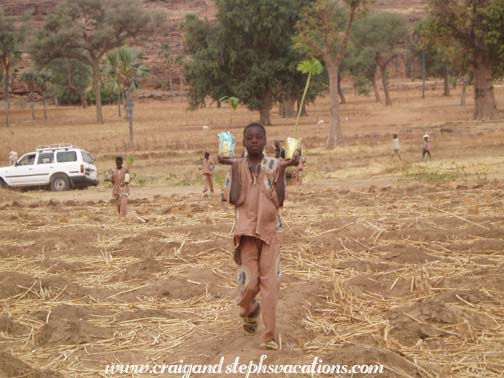
The trees arrive in Kori-Maounde
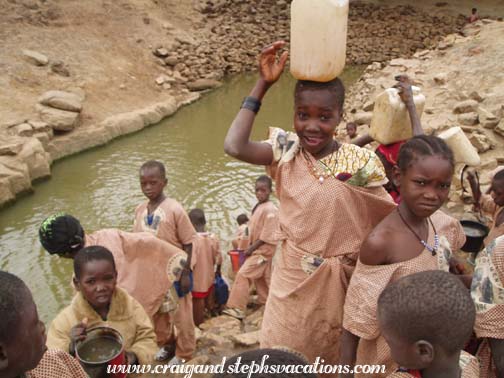
Fetching water
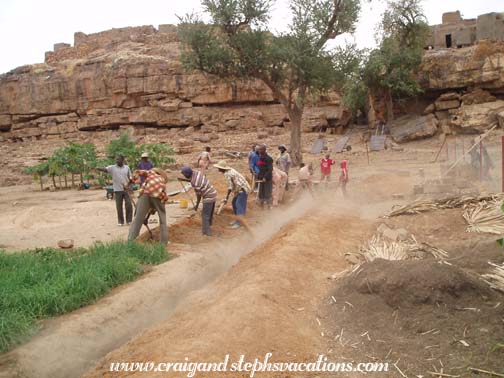
Village men fill in the trench
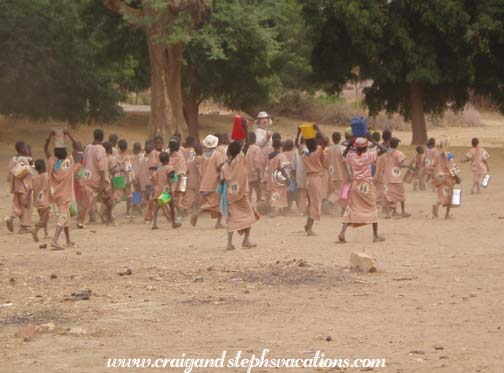
Craig and his water brigade
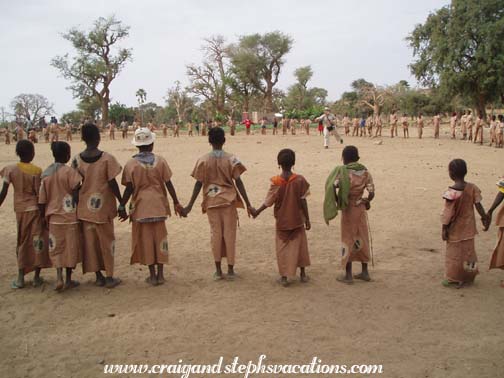
Frisbee
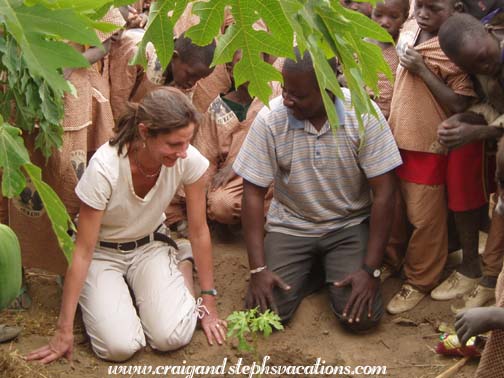
Pam and Daniel plant the first tree
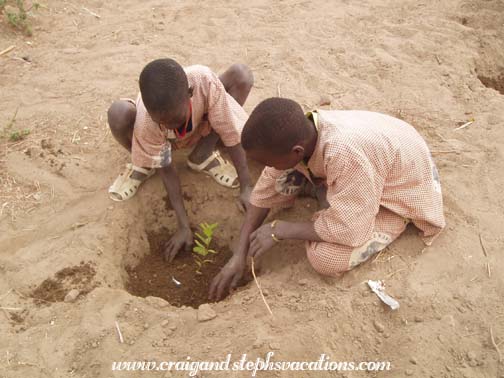
Students plant a tree
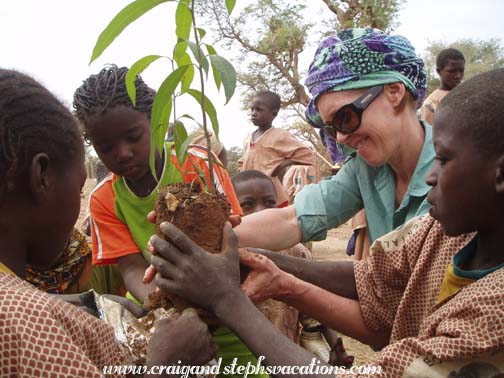
Susan plants a tree with the students

Tina's tree
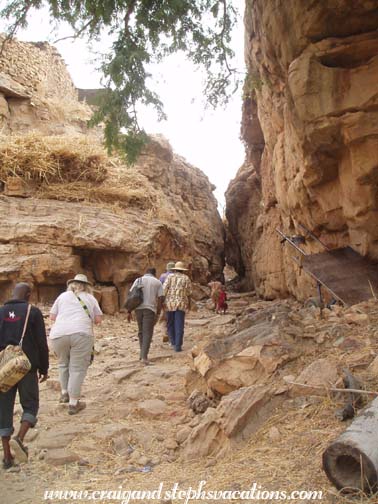
Walking from the school to the village
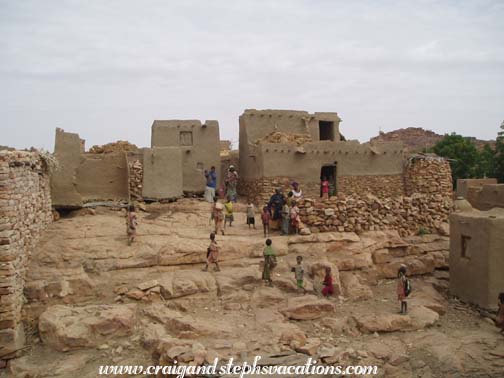
Village
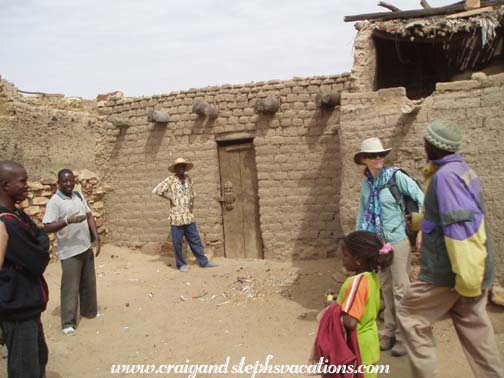
House of the Napo chiefs
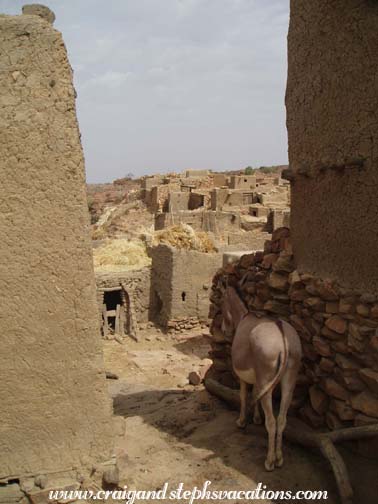
Kori-Maounde

View of school and garden from village
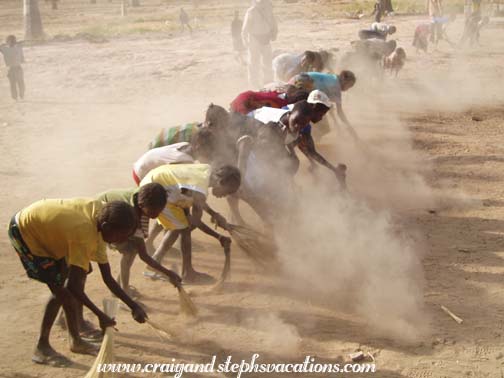
Kids sweep the school courtyard
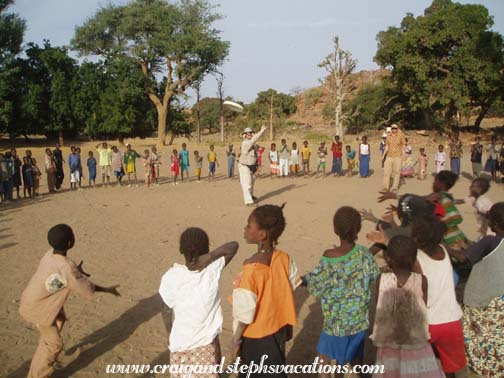
Frisbee
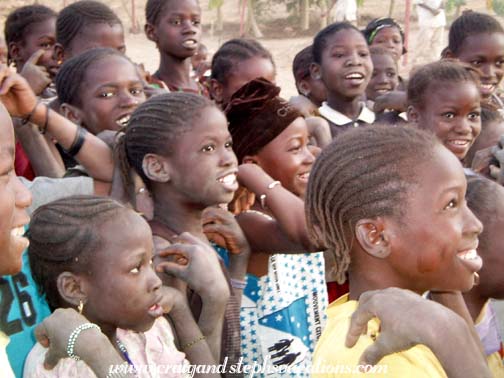
Head, Shoulders, Knees, and Toes
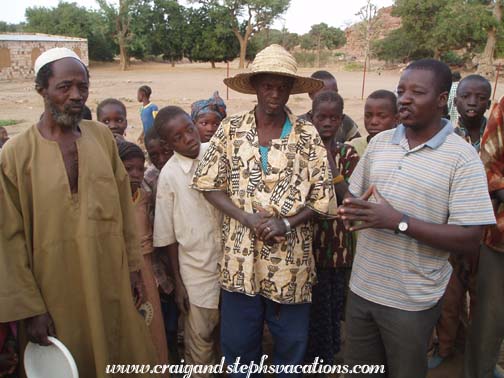
Farewell blessing - Boureima Napo, Chief Amadou Napo, and Daniel
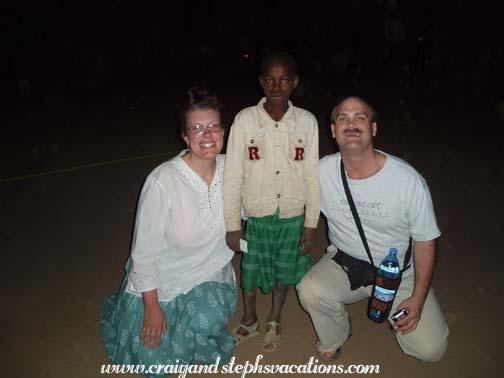
Steph, Boureima, and Craig

|






